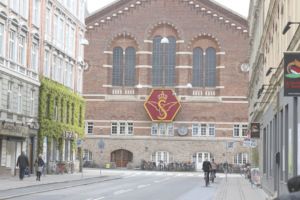Opinion
Prospects of the City: A story of our times
This article is more than 9 years old.

As it’s locally known: Ismael-gade
In which the prospector spots a face from the past and is reminded how it is fit for man to face his existence.
Blast from the past
Strolling down Istedgade in the sun and studying the faces along the way, I reached the corner of Gasværksvej and … stopped.
There he was: Ismael the old, nay immortal Turk who until four or five years ago ran a combined junk and barbershop on Eskildsgade.
The one-stop shop …
Ismael’s shop was there when I moved to Vesterbro in 1986. It was from him that I bought the things I needed for my new apartment: a red telephone, a radio, pots and pans, glasses, knives and forks, a tea-cosy. You name it – Ismael had it … somewhere!
Not that you’d always find what you were looking for in the mountains of junk he had amassed. Once upon a time there’d been a system, but it wasn’t long until the sheer volume made it impossible.
A bell announced to Ismael when there was a potential customer in his shop. And sometimes he would appear to see who or what it was. But normally he’d stay where he was, somewhere in the mountains of junk.
If you needed to pay him for a toaster, you had to holler his name. And then there’d be a sound and he’d materialise. You’d ask the price, but Ismael would not answer and instead produce some knick-knack from somewhere and ask you if you wanted to own that item too. A bargain would be struck, and I would walk away with something I had not known I needed plus the something I had wanted. It had cost almost no money.
… that crops your locks
I liked Ismael’s place, and when he put up a handwritten sign that he would cut your hair for 40kr, I’d go for that purpose too. If Ismael was not an accomplished barber, he certainly knew how to use his machine.
The one hairstyle he mastered was the crew-cut. You had the choice between three, six or nine milimeters. I usually chose six, and while he cut my hair we’d talk about stories from the Bible.
Call me Ismael
There Ismael was, right before my eyes. Not being able to pay the rent in gentrified Vesterbro, he lost his shop several years ago, taking to the streets to collect empties to get the pant. But it wasn’t long before he’d developed the business. His wares can still be found on the pavement – this time in a supermarket cart.
Far from feeling sorry for him, I felt admiration for his endurance, imagination and spirit – for his refusal to give up. Almost 80 years old by now, unshaven and with a hat pulled down over his ears, this old indomitable scavenger – by his very presence – is giving the middle finger to both death and gentrification.
His presence admonishes the passers-by that not only is Ismael Son of God still there to be reckoned with, but that he plans to stick around for as long as it takes to teach this deluded world to give up its moaning, put up a fight and reap the joys of surrender.
About
Per Smidl As the author of the 1995 essay ’Victim of Welfare. An Essay on State and Individual in Denmark’ and 2011 novel ’Wagon 537 Christiania’, Per Smidl is no stranger to controversy. After 12 years of self-imposed exile in Prague, he is back in his native Copenhagen, a city he will always have a unique perspective on.










































